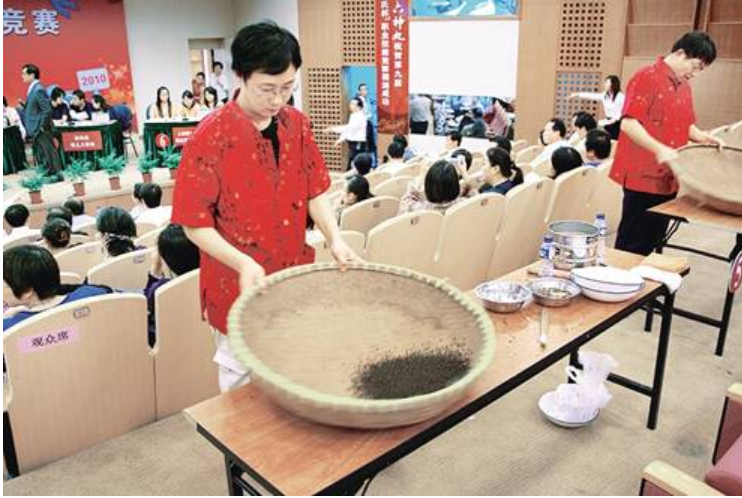
(Reporter: Xing Beilin) With a flat round split-bamboo basket about one meter in diameter, a pot of fresh water, a ladle and a brush, a heap of medicinal powder turned into uniform and neat handmade pills as small as soybeans after being repeatedly brushed, turned and shaken.
The one who made the “magical change” is none other than Huang Yilv, a young man born in 1980s. Now the thirty-five is a one of the few “veteran pharmaceutical workers” in Shanghai Ley’s Pharmaceutical (West Area) Co., Ltd who master the technique of handmaking pills, a unique TCM craft.
Each pill is five millimeters in diameter
Huang brushed a proper amount of fresh water on the basket, and then sprinkled some medicinal powder on it. Holding the basket in both hands, he turned it round and round, brushed the powder off the basket, lifted the basket in both hands and then rocking-turned the basket anticlockwise forcibly. The powder gathered gradually and became bigger. Huang brushed some water again, sprinkled powder, shook the basket and brushed the powder over and over again until the pills got bigger and turned into granules half to a millimeter in diameter. Irregular pills too big or to small were sifted out. “These are ‘pill heads’.” Huang pointed at the pills of different sizes.
Later, Huang sifted out all unqualified “pill heads” and started another round of brushing water, sprinkling powder and turning the basket, which alternated with movements of kneading, striking and overturning. After such an alternation for 40 minutes, half of kilo powder turned into uniform and full pills. Measured with a screening device, each pill was around five millimeters in diameter. Huang explained, this traditional technique seems simple but it’s very difficult to operate. It’s hard to control the proportion between water and powder, and even harder to make sure of uniform pills with the force of the arms and the waist. “Despite of the one-gram weight of each pill, it’s sheer manual labor to make them. It’s an exercise for the whole body as if you were huala hooping.”
Huang also told the reporter that since Huangdi Neijing (or The Inner Canon of the Yellow Emperor) was published, the making of TCM pills by hands has been in practice for thousands of years. Now, even though pills can be produced by machines, handmade pills are more uniform and the formulation of some TCM pills with a lot of ingredients can be only made manually. The size of handmade pills can be adjusted according to the conditions of the patient, and the wastage of medicinal materials can be lowered by 10% at least, compared with machine manufacturing. It’s a pity that now fewer and fewer workers know how to handmake pills. Even in Ley’s Pharmaceutical (West Area) Co., Ltd, there are less than ten workers who master this technique and most of them are veteran workers over sixty years old.
Huang keeps in mind the “characters” of over 700 kinds of TCM
“There are about 700 kinds of common Chinese herbal medicine, including herbs, roots, seeds, fruits, minerals and animals...” Huang just couldn’t stop when it came to Chinese medicinal materials. “Different materials have different ‘characters’. Take root of rehmannia and rehmannia glutinosa for example. Both are very sticky. Animals like the gecko are fatty. Some mineral materials must be boiled in water before being ground into powder while some other materials have to be dried. The ratio of water for every kind of material is different. With too much water, “pill heads” cannot rise up; too little water, the powder is too dry.” Huang added, when he started learning the skill, he often added too much water and thus the powder turned into pastry instead of pills.
As for his own learning experience, Huang would like to describe it as obsession. “At that time, as long as I was free, I would practice the actions. When my arms ached, I would take a break and then go on to practice.” Huang also said he would spend a dozen of hours practicing at the beginning. He bought a special basket and took it home, so he could go on practicing after work. “Whenever I found a good way to make pills, I would be more excited and thrilled than I would be as if I won a big lottery.” After hard training day in and day out, he finally acquired the skill, and stood out among his peers, wining great acclaim from veteran workers.
Love and hard work enabled Huang to master the craft
Now, Huang is not only a “great master” of handmade pills, but also a qualified formulation worker and a skilled decocting worker. It’s hard to imagine that he used to specialize in mechatronics, way too irrelevant to TCM production. In 2007, for love of TCM industry, Huang applied for a job as a storekeeper in the Ley’s Pharmaceutical (West Area) Co., Ltd. Since then, he has buried himself in heaps of herbs on his pilgrimage from a layman to a pharmaceutical worker. He felt shy to tell the reporter that he was able to master this craft just because of his great love for the TCM industry, and was willing to work hard. “I would just spend more time learning and practicing than others. When I study, I often ask myself a lot of questions, think more, and try my best.”
When it comes to the dilemma of passing on the craft of handmade pills, Huang told the reporter that he would very much like to teach his skill to more lovers of TCM. “It would be a great shame if this traditional skill should get lost in our generation after being handed down for thousands of years.”